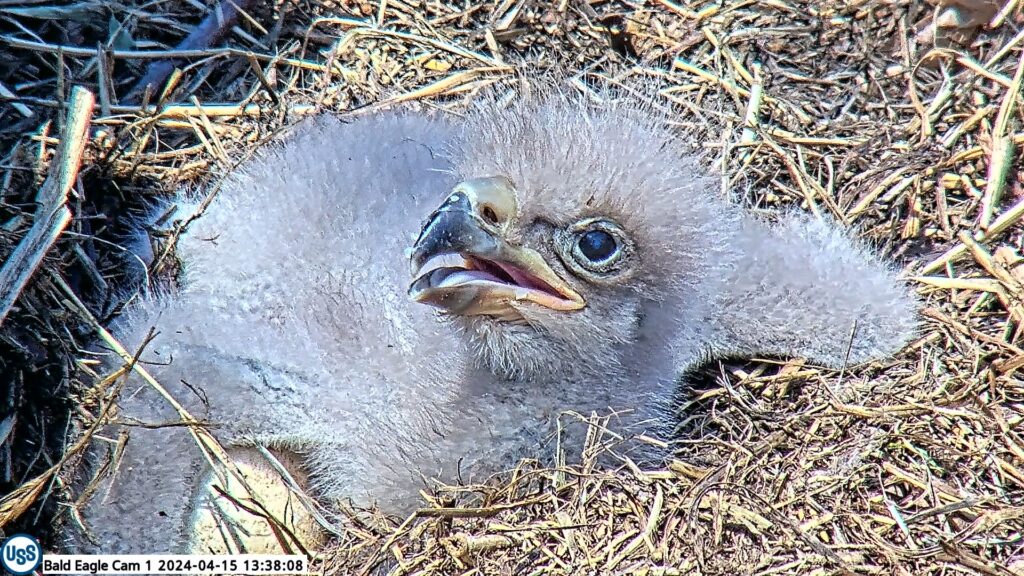The hope of a second eaglet hatching in the U.S. Steel Mon Valley Works Irvin Plant bald eagles nest has been dashed.
Through the chat on the U.S. Steel PixCams the faithful have been keeping watch, counting down the days and hoping to spot the pip — the internal cracks the eaglet makes to breathe on its own and emerge from the egg shell — that would signal that second baby in Claire and Irvin’s nest. But the USS 8 egg was laid on March 5, and plant manager Don German said eggs are not viable after 40 days. He said the egg is now 44 days old.
What went wrong? German said it could be the result of a number of factors. “We don’t know what was inside the egg, whether it was fertile,” he explained. For example, this year’s egg laid at the Hays bald eagle nest had no embryo, so it was hollow.
A retired professor who has been following bald eagles and posting about them under the screen name elfruler is a source German turns to for information and statistics about bald eagles. The avid birdwatcher charts the success rates of clutches — number of eggs laid — and much, much more. The report there notes an 87.7% chance rate of at least one egg hatching in a two-egg clutch, based on data collected since 2006. In a “perfect” hatch, which means both eggs will hatch, that percentage drops to 70 percent.
The failure to hatch could be a number of natural factors or weather conditions, although German doesn’t believe the latter played a role here.
What will happen to the egg? That remains to be seen. German has watched livestreams of other bald eagles’ nests and saw parents try to dig holes in their nests and bury unviable eggs. One egg stayed in a nest for 100 days. And, because the egg is high in nutrition and bald eagles are raptors, they might eat it. Or “If it will eventually crack, it will be dissolved into the nest,” he said.
As for USS 7, the eaglet, which hatched on April 7, is keeping those fans on the PixCams and the Steel City Eagles Facebook page charmed. German called the eaglet a blessing and a joy who has been eating so well that it is “growing like a weed.” On its 14th day, it should weigh 2.09 pounds, according to elfruler.

The fans will keep watching USS 7 as it grows and moves toward fledging, which German said should occur in about 85 days or about three months. It will remain in the nest until then before heading off on its own. Plus, followers can vote on a name for it in a contest that will benefit the Tamarack Wildlife Center in Saegertown, the nonprofit that helped save Rosie, an eaglet born in the Irvin Plant nest in 2022, when it was knocked off the nest accidentally and broke 10 tail feathers.
Claire and Irvin’s followers came up with six name choices: Lunar, Solar, Lucky, 7Up, 007 and Steel. (The last name came from Pittsburgh Pirates player Andrew McCutchen’s first son, German explained, hoping that connection might lure more donations.) The contest is running for two weeks, ending Friday, April 26 at 8 p.m. with the winning name announced the next day on Tamarack’s Facebook Live. The minimum donation is $5, and German will mail to anyone voting a U.S. Steel squishy eagle, a favorite memento he gives out at his talks and presentations.
The contest description includes U.S. Steel’s commitment to Tamarack and its work and a link to Rosie’s story.
German said typically bald eagles are not named. Part of the rationale is that it’s difficult to tell them apart, and once they leave the nest, they are gone. “The parents typically only get named because they are part of the nest,” he added, and remain there. “We decided last year to [run a contest]. We thought it would be cool to name it and do a fundraiser for Tamarack.”
Since Rosie’s successful recovery, U.S. Steel has made two $20,000 donations to Tamarack — the first for an X-ray machine and another for a needed generator. “In Saegertown, they can lose power for a long period of time,” he said. “It’s not good for the animals.”
Helen is a copy editor at the Pittsburgh Post-Gazette, but she's currently on strike. Contact her at hfallon@unionprogress.com.



